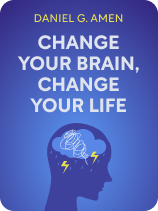

This article is an excerpt from the Shortform book guide to "Change Your Brain, Change Your Life" by Daniel G. Amen. Shortform has the world's best summaries and analyses of books you should be reading.
Like this article? Sign up for a free trial here.
Can food make you smarter? What’s wrong with traditional medical diagnosis? How can your brain physiology affect your behavior?
Many people suffer from physical, mental, and cognitive problems. In Change Your Brain, Change Your Life, psychiatrist and brain health expert Dr. Daniel Amen argues that, to effectively treat and overcome these problems, you must help your brain recover from physical damage and enhance its overall health.
Continue reading for several Dr. Daniel Amen quotes from Change Your Brain, Change Your Life that will give you a good sense of the book’s ideas.
Dr. Daniel Amen Quotes
Leveraging 30 years of patient experience, Dr. Daniel Amen offers a new, more effective approach to treating and overcoming physical, mental, and cognitive issues in his book Change Your Brain, Change Your Life.
We’ve collected several Dr. Daniel Amen quotes from Change Your Brain, Change Your Life and provided them along with some context and explanation to help you understand where Amen is coming from.
“The brain is an integrated whole, a symphony of parts that work together to create and sustain a life.”
According to Amen, the brain has five main regions, each playing a unique role in how you function: the limbic system, the basal ganglia, the prefrontal cortex, the anterior cingulate gyrus (ACG), and the temporal lobes. He explains that damage or dysfunction in any of these regions can lead to their own set of specific symptoms.
“In most family physician, pediatrician, psychiatrist, psychologist, or therapist offices patients report symptoms and doctors give them a diagnosis based on those symptoms. … None of these diagnostic labels tells us one thing about the underlying biology of these problems, and so people end up with one-size-fits-all treatment plans, which is the cause of many treatment failures.”
This quote illustrates that Amen realized that many people’s physical, mental, and cognitive issues arise from physical damage to specific regions of the brain and their associated functions. However, traditional medical approaches don’t take this into account: Practitioners typically observe and make diagnoses based on the external expression, or symptoms, of these underlying physical damages. As a result, patients’ issues may be misdiagnosed and they may receive inadequate treatments.
Amen’s approach is informed by SPECT (single photon emission computed tomography) scans—a type of brain imaging that shows a brain’s blood flow and electrical activity. Through these scans, Amen found that he could identify a wide range of indicators of poor brain health, including physical trauma, toxin exposure, infections, inadequate neural stimulation, and unbalanced neurotransmitters (chemical messengers that regulate mood and cognition). He noticed that certain brain patterns seemed to be associated with particular health conditions.
“Human behavior is more complex than society’s damning labels would have us believe. We are far too quick to attribute people’s actions to a bad character, when the source of their actions may not be their choice at all, but a problem with brain physiology.”
In this quote, Amen emphasizes that effective treatment plans require a holistic approach that addresses biological, psychological, social, and spiritual factors. He explains that these four factors interdependently influence your overall health—and, by extension, your brain health and function. He asserts that the most effective way to provide long-term relief for many health issues is to treat them at the root by repairing physical damage to your brain and enhancing its overall health.
“Your thoughts really matter. They can either help or hurt your deep limbic system.“
If you find yourself overwhelmed with persistent sadness, perceiving the world through a bleak and colorless lens, you may be experiencing limbic system dysfunction. These symptoms align with the telltale characteristics Amen describes, including the following:
- Emotional distress: feelings of sadness, excessive guilt, or crying spells
- Lack of vitality and interest: low energy levels, appetite and sleep problems, fluctuations in sexual responsiveness, and a tendency toward social isolation
- Negative self-perception: low self-confidence and heightened sensitivity to criticism
- Cognitive struggles: memory lapses and issues with concentration
- Sensory sensitivity: heightened adverse response to odors
“One cinnamon roll can cost you 720 calories and will drain your brain, while a 400-calorie salad made of spinach, salmon, organic blueberries, apples, walnuts, and red bell peppers with oil and vinegar dressing will supercharge your energy and make you smarter.”
In this quote, Amen recommends that you maintain a well-balanced diet rich in essential nutrients like omega-3 fatty acids and antioxidants to promote efficient communication between brain cells and to balance neurotransmitter levels. (Shortform note: Experts agree with Amen’s recommendations for a well-balanced diet. They emphasize the importance of healthy fats in particular, noting that omega-3 fatty acids are linked to a lower risk of certain degenerative brain diseases. Additionally, studies show a link between fiber deficiency and cognitive impairment as well, so a brain-supporting diet should also include fiber.)

———End of Preview———
Like what you just read? Read the rest of the world's best book summary and analysis of Daniel G. Amen's "Change Your Brain, Change Your Life" at Shortform.
Here's what you'll find in our full Change Your Brain, Change Your Life summary:
- A more effective approach to overcoming physical, mental, and cognitive issues
- The four factors to nurture to improve your brain health
- Why listening to Mozart can enhance your focus and mood control






